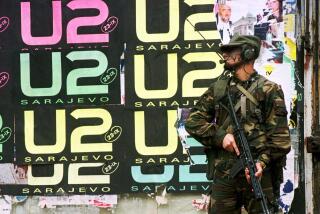Croatia Comes Together at Right Time
- Share via
PARIS — The most significant kick in Croatia’s march to today’s World Cup semifinal against France was not aimed at the ball.
Its target was the stomach of a baton-wielding policeman eight years ago, when a game between Dynamo Zagreb and Red Star Belgrade degenerated into a riot.
Zvonimir Boban was Zagreb’s captain that day, only 22 and only three years removed from having won the World Youth Championship in Chile with Yugoslavia.
But by 1990, Yugoslavia was coming apart at the seams, and when the game that day suddenly turned into a fight between Zagreb--meaning Croatian--fans and a more than heavy-handed Yugoslav police force, Boban sided with the fans.
His kick, intended to protect a fan from a police baton, cost him his place on the Yugoslav team for the 1990 World Cup in Italy, but it earned him instant hero status in soon-to-be-independent Croatia.
Within a year, Croatia had broken away from Yugoslavia and Boban was named captain of the new national team.
All of which makes it ironic that one of the items Coach Miroslav Blazevic was holding on the sideline during Croatia’s epic semifinal against Germany in Lyon on Saturday was a gendarme’s hat.
It had been given to him as a good-luck charm before Croatia’s second-round game against Romania, but it served a double purpose. One was to remind everyone of French policeman Daniel Nivel, still in a coma and with permanent brain damage after his beating by hooligans in Lens. The other, not-so-subtle purpose was to remind everyone that the hooligans were German.
There were many expressions of nationalism at the Stade de Gerland that night--the gigantic Croatian flags passed hand to hand over the heads of thousands of red-and-white-checkered fans, for one.
There were also the T-shirts worn by each Croatian player, bearing the slogan “Proud to be a Croat” and featuring their own color picture on the front and the team picture on the back.
The fierce nationalism of the players was explained by defender Igor Stimac.
“We were under Yugoslavia for 45 years,” he said. “We could not say we were Croatian then, so you understand why we now tell everyone. This is about football, but it is also about our country. We want to show the world that we are a great nation, a great people.”
Listen also to another defender, Slaven Bilic.
“We are a hot-headed people,” he said. “But we also want to show the world we are a cultured one.”
From a soccer standpoint, Bilic will get no argument. Croatia plays a hard physical game--ask the Germans--but also has players who can lift the game to an almost artistic level. “The Brazil of Europe” is a compliment once intended for Yugoslavia but now inherited by Croatia.
Nor are the Croatians intimidated by the big stage. After all, it was not only Boban who won the World Youth Championship in 1987. His current Croatian teammates Robert Prosinecki, Davor Suker and Robert Jarni were also on that Yugoslav team in Chile.
The breakup of Yugoslavia cost it more than territory; it took the heart out of a hugely talented team.
None of that “golden generation” of players is more symbolic of Croatia than Suker, the tall, dark and outspoken striker who has scored four goals in the World Cup and threatens to score more today.
“In our system, I have the impression that I can score at any moment,” he said after his 85th-minute goal had driven the final nail into Germany’s coffin.
(Not that the Germans should have been surprised by the defeat; it was then-West Germany that Boban, Suker and then-Yugoslavia beat in the final in Chile 11 years and several political upheavals ago.)
Croatia’s national team is called “the Firing Squad,” by its fans, and Suker, 30, is the player massaging the trigger.
In his first 32 games for Croatia, Suker scored 26 goals. A dozen of those were scored in 10 qualifying games for the 1996 European Championship, and two of them stunned Italy. He scored five more on the road to France 98.
Suker had a poor season with Spain’s Real Madrid, which acquired him from Sevilla in 1996 for $5 million and five players, but he rediscovered his scoring touch in time for the World Cup.
The French will be put to the test today. Croatia is riding high on a wave of national euphoria.
“This means a lot for our homeland,” Croatian President Franjo Tudjman said in Lyon.
Bilic put it another way.
“The world only remembers the finalists,” he said. “And we want to be remembered.”
To get live updates on today’s World Cup semifinal on The Times’ Web site, go to: https://www.latimes.com/worldcup.






